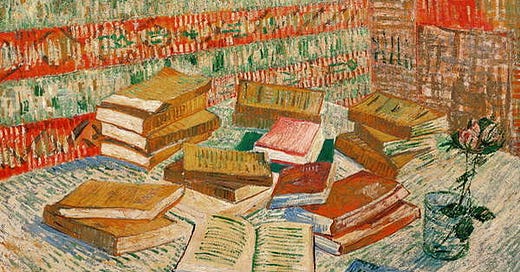My friend Ancient Philosophy wrote a series of questions that he may or may not have expected an answer to, but I found the questions helpful to think through and so I answered them. Broadly speaking, they are on the relationship between primary sources and commentaries on them.
Question: Can commentaries only be read in conjunction with the primary literature they comment upon, or are they more or less independent works, just as all other works borrow, allude, adapt and react to previous texts?
Answer: Commentaries, in almost all cases, should only be read in conjunction with the primary sources they comment upon. This is so because to read a book about a Platonic dialogue one has not read is to receive an account which one cannot question. One becomes a mere parrot. (one can also become a mere parrot of Plato without trying to understand if his view itself is true, simply)
Exception: I read a book about the Phaedo as an 18 year old that made me desperately want to read Plato afterwards. To this day, I don't remember its title.
Question: Can popular, primary works (e.g. “Great Books”) be read on their own at this present temporal point in the tradition, or is the historical reception of the work, commentaries included, a necessary part of understanding the work?
Answer: Primary sources can be helpfully read without commentaries or knowledge of their historical reception. If, as Thucydides says, his work is a possession for all time--and if other great thinkers agree to this and are also similarly aware of the fragility of things and difficulty of long term transmission--then, I tend to presuppose that he and they have supplied within their work most or even all of the context that is necessary to understand the core teaching of the work. Would we understand Plato and Aristotle less well if we lost Homer; absolutely! However, my partially educated hope is that I would still understand something very important from both of them even if the source of many allusions, etc, was lost.
Question: Do commentaries owe the original work fidelity, and so must try to understand and explain what was said? Is this the dividing line between what makes a commentary or not?
Answer: Commentaries should usually strive for the greatest level of fidelity possible to the text they comment upon. On RARE occasions, they should move into flights of their own thought, but they should be clear that this is what they are doing; or say that Plato, etc, is the occasion for a thought about something that Plato might not have himself likely thought; or admit when a claim is speculative or a kind of reach beyond fidelity.
Question: Can a commentary be explicative (mirror what was said, a servant to the text) or edifying (build upon and extend what was said, a different and new project)?
Answer: Re above, commentaries should be explicative, but in almost all explication, new potential thoughts might emerge, and if they are illuminating, should be mentioned. There might also be books that attempt to show how a thinker's thought can applied to today. I.e., the polis is impossible in present circumstances, but can some approximation of its best features be effected in political life today? One can mirror the text in part while also extending the thought.
Question: Are commentaries intended to be clearer than that which they comment upon, because they are explanations of them?
Answer: Most commentaries are clearer than what they comment upon. This is both a virtue and a vice. The text was probably less clear precisely because this was necessary to express the nuance or complexity of the phenomena under consideration. On the other hand, it is good that an attempt was made to render things more intelligible with the hope that perhaps that original source was slightly more obscure than necessary (perhaps in part to generously allow the reader to complete the thought pointed to, and so come into fuller possession of that thought than they would have if it was stated more clearly). Perhaps the best commentaries retain at least a little bit of the ambiguity of the original.
Question: Is a commentary more authoritative than the original text because it is somehow explicit on subtleties the original author was coy about?
Answer: The commentary ought not be more authoritative than the original text. It could only do so if it itself was a great text. Nevertheless, while a commentary can never replace the authority of a great text, good commentaries can help lay out the terrain of the fundamental alternatives. Surely Plato thinks justice is X or Y? Or that the gods exist or do not exist? And a scholar could come to represent one of those possibilities.
Coda: In the end, however much the great thinkers surpass us, and however much we owe them a deferential reading in order to see the world more clearly, we have to determine for ourselves which ideas are true, or which seem to be most likely. We have to say, "I think X is true," without referring to either the primary text or the commentary.




